Intel SSD 520 Review: Cherryville Brings Reliability to SandForce
by Anand Lal Shimpi on February 6, 2012 11:00 AM ESTRandom Read/Write Speed
The four corners of SSD performance are as follows: random read, random write, sequential read and sequential write speed. Random accesses are generally small in size, while sequential accesses tend to be larger and thus we have the four Iometer tests we use in all of our reviews.
Our first test writes 4KB in a completely random pattern over an 8GB space of the drive to simulate the sort of random access that you'd see on an OS drive (even this is more stressful than a normal desktop user would see). I perform three concurrent IOs and run the test for 3 minutes. The results reported are in average MB/s over the entire time. We use both standard pseudo randomly generated data for each write as well as fully random data to show you both the maximum and minimum performance offered by SandForce based drives in these tests. The average performance of SF drives will likely be somewhere in between the two values for each drive you see in the graphs. For an understanding of why this matters, read our original SandForce article.
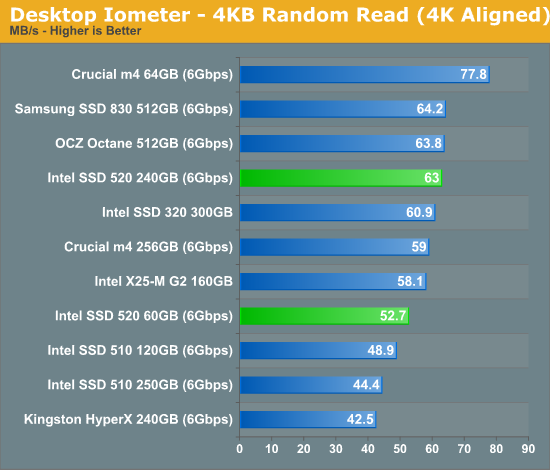
Random read performance seems to have topped out around 60MB/s for most drives and the 520 is no different here.
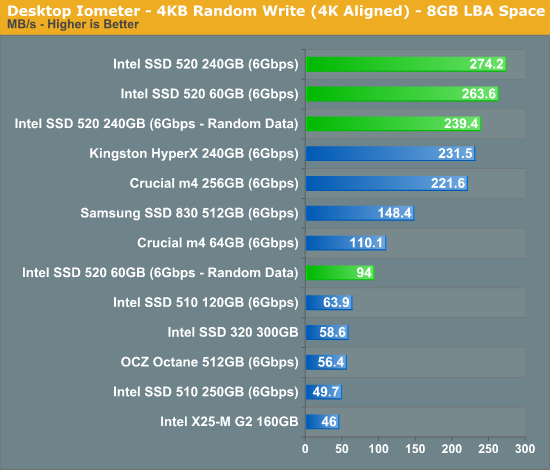
Random write performance, especially with highly compressible data sets the 520 performs beautifully - even outpacing the SF-2281 based Kingston HyperX.
Many of you have asked for random write performance at higher queue depths. What I have below is our 4KB random write test performed at a queue depth of 32 instead of 3. While the vast majority of desktop usage models experience queue depths of 0 - 5, higher depths are possible in heavy I/O (and multi-user) workloads:
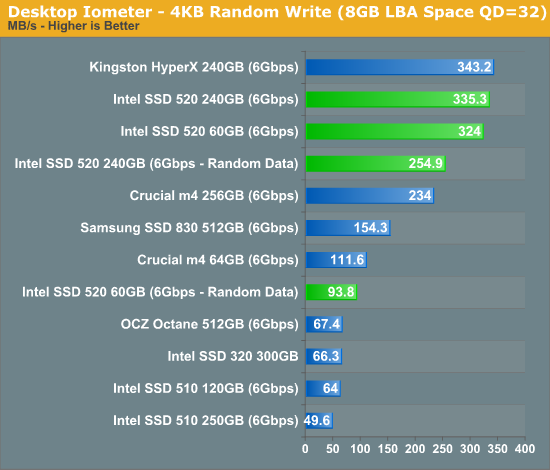
At higher queue depths the HyperX catches up to and surpassed the 520, perhaps indicating that Intel has done some work to optimize low queue depth performance on the 520 (likely what most end users will encounter).
Sequential Read/Write Speed
To measure sequential performance I ran a 1 minute long 128KB sequential test over the entire span of the drive at a queue depth of 1. The results reported are in average MB/s over the entire test length.
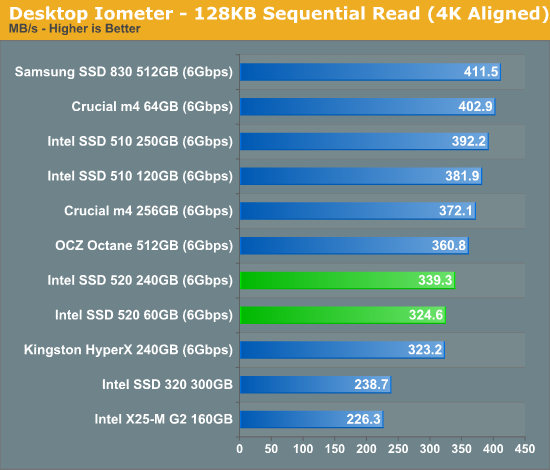
Sequential read performance is actually a bit lower than Intel's 510, but still higher than a standard SF-2281 drive.
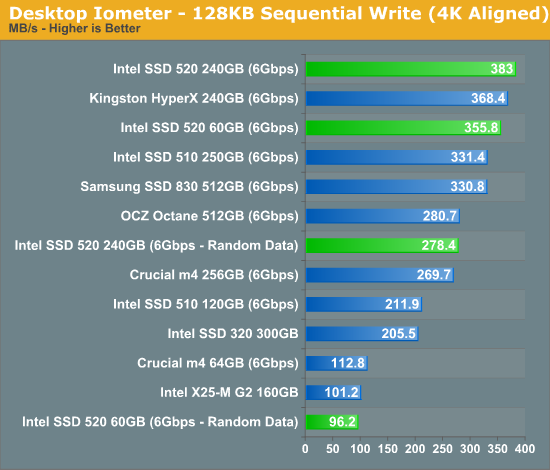
It's important to note just how close the 520's peak random write performance is to its sequential write performance. A big part of this is obviously that the SF-2281 is throwing away a lot of the data it has to write, but even if we compare incompressible 4KB random write to highly compressible 128KB sequential write we see a good ratio. The closer those two values are the more optimal the controller/firmware design is as, in theory, smaller random writes should be grouped to effectively become large sequential writes from the perspective of the NAND.










138 Comments
View All Comments
Beenthere - Wednesday, February 8, 2012 - link
Unfortunately Intel just like OCZ, Corsair and most all the rest of the SSD purveyors have adopted the Asus Biz model where you ship it today and hope you can fix it tomorrow when people find it's got lots of defects.It's totally unscrupulous to ship products with defects that have not been corrected due to a proper validation procedure not being implemented because the mfg. was more interested in rushing the product to market for quick profits or they are simply incompetent.
If you bought a new car and the brakes didn't function you'd have a Helleva lawsuit. If the car's trans only worked on Wednesdays and Fridays, you'll have a Helleva lawsuit. If the car maker only responded to the problems by replacing the defective product with another defective product - yup, you'd have a Helleva lawsuit.
This is how a lot of SSD companies are responding the defects in consumer grade SSDs.
NitroWare - Thursday, February 9, 2012 - link
I understand what your saying but ASUS is a company who do no skimp on overall validation of their products. This can be objectively proven by comparing their BIOS changelogs and QVL lists against a tier 2 manufacturer.Enthusiast products are touch and go especially when high speeds or aggressive compatibility is involved. You can not have it both ways wether its a SSD, Mobo, VGA or even a car
There are 'stable' products and there are 'aggressive' products (esp mobos and vga)
The stable products, Intel Desktop Boards, Supermicro server/workstation boards, DELL/HP Prebuilts and some basic generic motherboards are BORING to part of the target market who are being targeted by cheap and fast SSDs.
Do dell even validate many different SSD controller on their desktop and portables?
There are firms who have SSD in Mission Critical apps. Either Team Lotus or Red Bull F1 I forget who switched all their pitcrew laptops to SSD due to vibration from the F1 engines.
Can you imagine what would happen if an engineer experiencing a BSOD such a frantic scenario ?
The target market want the bleeding edge and many vendors are forced to comply by playing the numbers game or including technical features on their products which have no benefit (eg extra power sockets) except as a marketing bulletpoint targeted to enthusiasts and matching their competition.
Many would be surprised how many features on components such as motherboards or power supplies are stuck on simply due to customer (OEM) requests or technical marketing/competitive demands.
There are parts of the enthusiast community, especially extreme and sub zero overclockers who don't care about 'stability' or who do not understand what the true meaning of this is. Their definition is stability is how much LN2 they can pour by balancing one hand with another hand on their mouse in vain effort to get their overclock stable.
Manufs of cheaper devices have never really cared about support and many have a small handful of design engineers who are already overworked. This has not changed in twenty years of PC add on devices.
It is a shame that some 'brand names' currently have issues really, a damm shame.
vol7ron - Tuesday, February 7, 2012 - link
One of Intel's biggest advantages was the spread spectrum of their wear-leveling controller. I may have missed it, but I didn't see any mention of it in the article.It would be nice if they could have combined the SF-2281 with their own controller to give a fast, controller that was spread evenly across the NAND, to further increase its shelf-life. Maybe that would be too costly, or maybe it wasn't needed, but I'm interested to hear what they have to say.
vol7ron
Sufo - Wednesday, February 8, 2012 - link
So, will the 720 be based on SF-2000? How far away is that?I'm soon to be building an enterprise server... are these Intel drives (5xx or 7xx) really up to enterprise load? Unlike many people, being able to pick something like the 710/720 would be a huge cost _saving_ - it seems to me that approved drives such as the HP ones cost 10x more than even these Intel drives.
On a side note, since Apple's acquisition of Anobit, is it safe to say the Genesis 2 is on hold?
Beenthere - Wednesday, February 8, 2012 - link
The story title is really inappropriate considering there is no proof that the 520 is any more reliable than other SSDs. There are even reports already of BSOD on the 520 drives at Intel's customer support forums.Wolfpup - Wednesday, February 8, 2012 - link
No question, BUT I'd still pick my Intel 320 over the 520. I still trust Intel's controller more, and the 320 is the only drive I know of that has built in hardware encryption. Completely awesome! I'm sure there must be other drives that do too, but that alone would have me picking the 320, and then when you consider I trust it more anyway, and it's a bit cheaper...Wish the 600GB 320 wasn't over $1000 though :-D Oh well, my 300GB one is okay, and my Seagate Momentus XTs are great too.
Beenthere - Wednesday, February 8, 2012 - link
Already reports of 520 BSOD at Intel support... :(Galvin - Friday, February 10, 2012 - link
I could get a BSOD and report in intel forums too. All I have to do is disable AHCI drivers in windows and reboot. Get a BSOD. I think the issue is not the drive but the user not setting their bios up correctly or windows correctly or both.Galvin - Friday, February 10, 2012 - link
Just wanted to update if you read that post. He fixed the problem. It had nothing to do with the drive. People want to hate intel just cause they're intel.mbryans - Thursday, February 9, 2012 - link
Intel SSD 520 Series 480 GB: random 4 KB writes up to (only) 42,000 IOPS? While for 240 GB could reach 60,000 IOPS. The greater capacity should be faster.